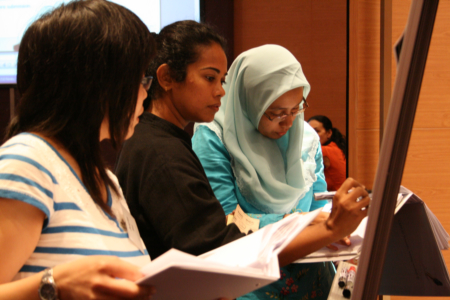Investing in the Future of HIV Research
TREAT Asia Programs Support Young Clinicians
July 2009– In some ways, the challenge of fighting HIV/AIDS in Asia can hinge on the question of human resources as much as medicine or research. When the epidemic first took firm root across the region in the late 1990s, doctors and nurses were faced with a deadly virus with which they had little or no experience.
Since then, initiatives such as TREAT Asia have helped healthcare workers develop the skills needed to treat HIV/AIDS in their own countries.
To a great extent, however, these skills belong to senior doctors and researchers, many of whom have been treating HIV/AIDS since the early days of the epidemic. And so the question is increasingly raised: Where is the next generation of HIV clinicians and researchers in Asia?

At the Bangkok scientific writing seminar, from left: Dr. Junyan Han from China, Dr Sasheela Sri La Si Ponnampalavanar from Malaysia, and Dr. Evy Yunihastuti from Indonesia.
|
TREAT Asia director Dr. Annette Sohn lays out the challenge in more detail. "As treatment regimens and clinical management become more complex, primary healthcare providers are referred to their local HIV specialists for help. As these experts become increasingly overloaded, how do we find more resources? In some places in Asia, it is not always easy to find doctors and nurses interested in caring for those with HIV. Patients are often poor and cared for under government programs with low remuneration."
To address the region's urgent need to develop a new generation of advanced HIV practitioners, TREAT Asia, in consultation with the Network's junior investigators, is implementing a series of educational programs aimed at building skills and enhancing research opportunities among these early-career scientists. "We want to support them to be successful in their fields," explained Dr. Sohn. "By providing these types of opportunities to junior doctors, we are investing in the long-term sustainability of our mission and network."
The first of TREAT Asia's training programs for junior researchers involved a scientific writing workshop in Bangkok in March, designed to help sharpen English-language scientific writing skills.
In mid-June, a second writing workshop was held in Kuala Lumpur focusing on publishing pediatric research. And a third on resistance and biostatistics took place in Bangkok that same month. This coming October at the TREAT Asia Network Meeting, a special half-day session will also be devoted to the interests of junior investigators.
The March writing workshop kicked off the new training program with a seminar focused on improving scientific writing from conception to final presentation and on clarifying the expectations of journal editors. Detailed presentations covered how to develop and write abstracts, the standard components of a research paper, and how to communicate with journal editors when submitting a manuscript.
Seventeen research scientists from 12 countries across Asia attended the program, including Dr. Lee Lee Low, a TREAT Asia co-investigator from Sungai Buloh Hospital in Kuala Lumpur, Malaysia. "Workshop participants were from different countries, they had different backgrounds, and many of us were new to the world of research and publication," she said. "We learned the whole process of writing and developing a research article, from searching for the most appropriate title to publicizing it."
The June workshop on resistance and biostatistics addressed some of the most complex HIV treatment and research challenges facing Asia. "Treatment failure is increasing in the region," explained Dr. Sohn. "We now have data, but many investigators don't know how to use it." The goal of the four-day workshop was to help junior researchers better understand HIV drug resistance. The workshop also presented advanced level biostatistics seminars, so that participants could develop the tools to analyze some of their own resistance data and evaluate the quality of care they are delivering.
The TREAT Asia writing workshops were funded by the Office of AIDS Research at the U.S. National Institutes of Health and the Austrian AIDS Life Association. The resistance and biostatistics workshop was supported by a grant from the Dutch Ministry of Foreign Affairs through Aids Fonds.